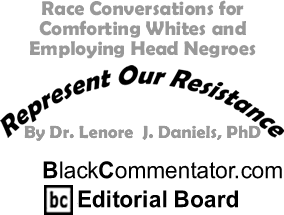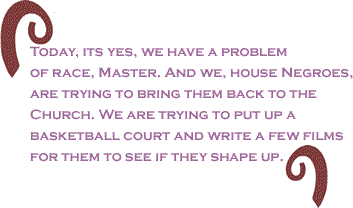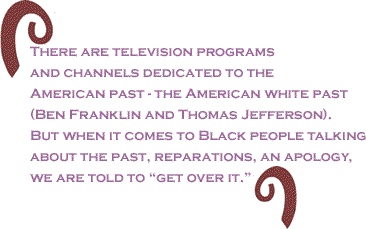
|
||||||||||||||||||||||
 |
||||||||||||||||||||||
 |
||||||||||||||||||||||
 |
||||||||||||||||||||||
 |
||||||||||||||||||||||
 |
||||||||||||||||||||||
 |
| The current issue is always free to everyone |
|
|
 |
Have you really paid attention to recent “conversations” on race? Rev. Jeremiah Wright’s exposure has corporate media scrambling to host television and radio programs on race. Have you asked yourself why? Why the “conversation” doesn’t continue 24/7? Why is a “conversation” important only after an “unidentifiable” someone or something surfaces from the “Black Community”? Brian Williams and his cohorts at MSNBC thought such a “conversation” on race was necessary. It was called “A Conversation on Race.” Such programs are not worth the bother to product or watch. For one, the host or hosts and the guests, the speakers, commentators are handpicked stool pigeons. Worse, the angle has already been predetermined. As Dr. Greg Carr (African American Studies, Howard University) suggested, the pathology of Black life was the intended angle of this particular “conversation.” After all, Blacks are still those people socially criminal and psychologically bitter. Focusing on Black pathology would avoid from the outset any discussion of an imperialist war complex or an all-consuming economic market or an educational system linked to the prison industrial complex.
These events, these “conversations on race” usually feature Blacks who designate themselves among the “we.” “When his master said, ‘We have good food,’ the house Negro would say, ‘Yes, we have plenty of good food.’” Remember what Malcolm said? Today, its yes, we have a problem of race, Master. And we, house Negroes, are trying to bring them back to the Church. We are trying to put up a basketball court and write a few films for them to see if they shape up. We are trying, Master, to round up the “bad” ones and work with the juvenile courts to clean these hopeless kids up. We, with you, are trying Master. The more things change… A show like this dumb show is embarrassing to any Black person in the 21 Century who knows what his happening and what has happened. Any Black person knows the game: knows such a show is for the benefit of white America - for the benefit of finding out anything new (any more surprises, slip ups like the Rev. Wright) and ultimately to comfort whites into believing the program of race is the a problem of Black people in America. Luckily Dr. Carr was in the audience. It was Carr who spoke up and informed the guests and the host that conversations on race happens everyday in the Black Community. Oh, my God! A gasping Brian Williams, if he could gasp on camera. Not only are there these conversations, but the conversation on race doesn’t and shouldn’t revolve around Black pathology.
Carr reminded Williams of what he knows he knows: media images reflect whiteness. These images of whiteness re-enforce the idea to a young Black that the culture they grew up in is somehow pathological, inferior. It requires the young woman or young man to neuter or erase self, Carr said. Carr continued:
Brian Williams asked what should change about the “conversation?” Brian Williams! The handpicked guests!! MSNBC!!! What should CHANGE about the “conversation”? A panel before this panel did feature Dr. Michael Eric Dyson and Dr. Tim Wise. Both men spoke about a conversation on the pathology of whiteness. The conversation should ask what is wrong with white society, white supremacy. What about a conversation asking whites to take ownership of their part of the narrative of white supremacy? But Williams couldn’t handle these suggestions. He quickly turned to Malaak Compton-Rock, Founder and Director of The AngelRock Project. Compton-Rock
restored order! Williams asked her to talk about motherhood,
raising two children - while being Black. Compton-Rock As Wise stated, “whiteness isn’t to be transcended.” Blacks are to aspire to whiteness. Blacks are expected to “graduate” from Blackness. Here’s a “conversation” on race that will not be televised in Amerikkka. Engaging “structural difference,” said Dyson, institutional mechanisms, is something that must happened, but won’t anytime soon. Whites are obsessed with the past, Dyson said. There are television programs and channels dedicated to the American past - the American white past (Ben Franklin and Thomas Jefferson). But when it comes to Black people talking about the past, reparations, an apology, we are told to “get over it.” “How do we deal with the ‘centrality’ of the past?” Dyson asked. Well, we don’t wait to watch the next airing of “a conversation on race” after something else happens. Let’s get on with our “internal conversation” and put the lights out on these dumb shows for white comfort and head Negro employment. BlackCommentator.com Editorial Board member, Lenore Jean Daniels, PhD, has been a writer, for over thirty years of commentary, resistance criticism and cultural theory, and short stories with a Marxist sensibility to the impact of cultural narrative violence and its antithesis, resistance narratives. With entrenched dedication to justice and equality, she has served as a coordinator of student and community resistance projects that encourage the Black Feminist idea of an equalitarian community and facilitator of student-teacher communities behind the walls of academia for the last twenty years. Dr. Daniels holds a PhD in Modern American Literatures, with a specialty in Cultural Theory (race, gender, class narratives) from Loyola University, Chicago. Click here to contact Dr. Daniels.
|
Your comments are always welcome. e-Mail
re-print notice
If you send us an e-Mail message we may publish all or part of it, unless you tell us it is not for publication. You may also request that we withhold your name. Thank you very much for your readership. |
|
| May
15, 2008 Issue 277 |
|
| Executive Editor: Bill Fletcher, Jr. |
| Managing
Editor: |
| Publisher: Peter Gamble |
| Est. April 5, 2002 |
| Printer Friendly Version in resizeable plain text format or pdf format. |
 |
 |
 |
| |
| |























 talked
about her young daughter who has an Arab and white friend.
The daughter came home one day and asked why she didn’t have
long hair. The daughter also spoke of her hair as being “puffy.”
Now, Compton-Rock’s own hair is definitely done at a fine
salon. It is processed with big circles. The hair can shake
when she moves her head and a couple of times she had to push
her hair back. The daughter spoke of “puffy” hair. Here’s
a Black woman who is not proud to wear her hair natural, “puffy.”
I suppose she would argue that in a “post-race era” she is
“free” to choose. But she chooses whiteness and, on camera,
in the national media, offers this story about her daughter
feeling inferior, inadequate because her hair was not as long
as that of her friends. What does a mother with a salon “beauty”
hairstyle say to a little Black girl about the texture and
length of her hair? What does this mother teacher her daughter?
This is not academic. This is everyday. The mother is the
teacher and she is the leader. Here’s the pathology of whiteness
working in the everyday of our lives to destroy our families
and communities.
talked
about her young daughter who has an Arab and white friend.
The daughter came home one day and asked why she didn’t have
long hair. The daughter also spoke of her hair as being “puffy.”
Now, Compton-Rock’s own hair is definitely done at a fine
salon. It is processed with big circles. The hair can shake
when she moves her head and a couple of times she had to push
her hair back. The daughter spoke of “puffy” hair. Here’s
a Black woman who is not proud to wear her hair natural, “puffy.”
I suppose she would argue that in a “post-race era” she is
“free” to choose. But she chooses whiteness and, on camera,
in the national media, offers this story about her daughter
feeling inferior, inadequate because her hair was not as long
as that of her friends. What does a mother with a salon “beauty”
hairstyle say to a little Black girl about the texture and
length of her hair? What does this mother teacher her daughter?
This is not academic. This is everyday. The mother is the
teacher and she is the leader. Here’s the pathology of whiteness
working in the everyday of our lives to destroy our families
and communities.






